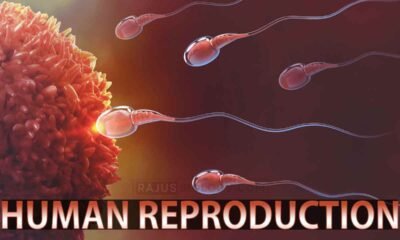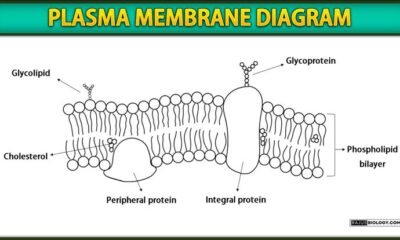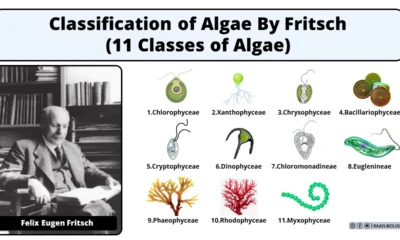Blog
Frog Digestive System Short Notes | Free Biology Notes

In this article we will discuss about the frog digestive system
Frog Digestive System
- The function of the frog digestive system is digestion and absorption
- Frog digestive system consists of alimentary canal along with digestive glands
Alimentary canal
- Alimentary canal is long, complete and coiled tube
- Alimentary canal consist of mouth, buccal cavity, pharynx, oesophagus, stomach, intestine, rectum, cloaca
Mouth
- Frog digestive system starts with the mouth
- Two bony jaws bound the mouth, and the jaws are covered by immovable lips
- Mouth helps in consumption of food. This process is known as ingestion.
Buccal cavity of frog
- Mouth opens into buccal cavity
- Buccal cavity has glandular epithelial lining that secrete mucus, helps in lubricating the food.
- Frog lacks salivary glands
Teeth
- Teeth occur in a row of maxillae bones in the upper jaw
- Function of teeth is to simply hold the prey and prevent it from slipping out
- The nature of teeth is homodont (similar), acrodont (not set in a socket), polyphyodont (replaced several times)
- The lower jaw lacks teeth
- Vomerine teeth are two rough bumps on the roof of the frog’s mouth. These function in holding and capturing prey.
Tongue
- Tongue is large, muscular and sticky
- Anterior end of tongue is attached to the inner border of lower jaw
- Posterior end is free and bifid
Pharynx
- The buccal cavity reaches short pharynx
- The pharynx tapers behind to lead to oesophagus through the gullet
- Gullet is the wide opening that leads to oesophagus
Oesophagus
- Oesophagus is short, wide and muscular tube
- Some alkaline digestive juice is secreted by the glandular lining of oesophagus
- The oesophagus opens into the stomach
Stomach
- Large and thick muscular sac like structure
- Anterior end of stomach is called cardiac end while the posterior end is called pyloric end
- The walls of stomach are muscular and glandular
- Stomach secrete HCL & proteolytic enzyme
- HCL makes the acidic PH of food & it is bacteriolytic
- In stomach, digestion of protein of food is started
Small intestine
- Small intestine is a long, coiled and narrow tube
- It comprises of two parts: anterior duodenum and posterior ileum
- The ducts from liver and pancreas open into the duodenum
- Bile juice emulsifies fat and pancreatic juices digest carbohydrates and proteins
- Digested food is absorbed by ileum
Rectum
- Large intestine is short and wide tube
- Its inner lining forms numerous folds
- In rectum undigested food material is stored which is ready to expel from cloaca
Cloaca
- The anus and the urinogenital apertures open into cloaca
- Cloaca opens to outside by the vent or cloacal aperture, lying at the hind end of body.
- Cloaca remove undigested food material.
Digestive glands of frog
Liver
- The largest gland of the body
- Bile is a greenish alkaline fluid secreted by liver
- Bile is stored sac called as gall bladder
- It changes the PH of food from acidic to alkaline
- Hepatic ducts joins the pancreatic duct to form a hepatopancreatic duct
- Ultimately opens into duodenum
Pancreas
- Pancreas is long and irregularly lobed gland
- It secrete pancreatic juice
- Pancreatic juice poured into duodenum through hepatopancreatic duct
- Pancreatic juice help digestion of ingested food
How Digestive System Works In Frog?
- Frog feeds on insects, worms, crustaceans, molluscs, small fish and even small frogs and tadpoles
- The prey is caught by rapid flicking of tongue and is swallowed as a whole
- Salivary glands are absent in case of frogs, the food is lubricated by the mucus secreted from the lining of buccal cavity and oesophagus
- The food is now passed to stomach
- Food remains in the stomach for up to 2-3hrs
- Gastric juice is secreted by the gastric glands of stomach wall
- Now acidic chyme enters the duodenum
- Three important substances mix with the food in intestine
- They are derived from three different sources: bile, pancreatic juice and intestinal juice
- Digestion is accomplished in the small intestine
- The faecal matter passes into cloaca

 Blog8 months ago
Blog8 months ago[PPT] Human Reproduction Class 12 Notes
- Blog8 months ago
Contribution of Indian Phycologists (4 Famous Algologist)
- Blog8 months ago
PG TRB Botany Study Material PDF Free Download

 Blog8 months ago
Blog8 months agoCell The Unit of Life Complete Notes | Class 11 & NEET Free Notes

 Blog8 months ago
Blog8 months ago[PPT] The living world Class 11 Notes

 Blog8 months ago
Blog8 months agoPlasma Membrane Structure and Functions | Free Biology Notes

 Blog8 months ago
Blog8 months agoJulus General Characteristics | Free Biology Notes

 Blog8 months ago
Blog8 months agoClassification of Algae By Fritsch (11 Classes of Algae)













